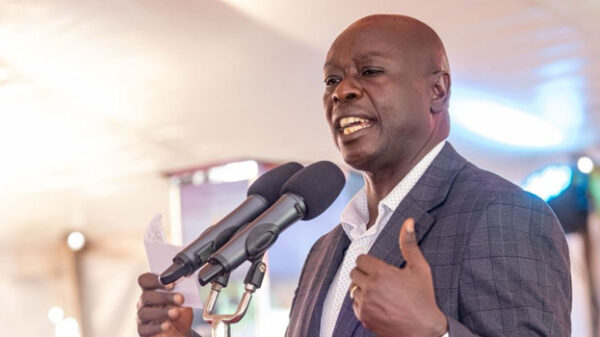
About a dozen Afghan women protested briefly Sunday outside the old Ministry for Women’s Affairs, which has now been replaced by a department that earned notoriety for enforcing strict islamic doctrine © AFP / BULENT KILIC
Kabul (AFP), Sep 20 – Fears were mounting in Afghanistan on Monday as the Taliban tightened their grip on women’s rights, slashing access to work and denying girls the right to secondary school education.
After pledging a softer version of their brutal and repressive regime of the 1990s, the Islamic fundamentalists have been stripping away at freedoms one month after seizing power.
“I may as well be dead,” said one woman, who was sacked from her senior role at the foreign ministry.
“I was in charge of a whole department and there were many women working with me… now we have all lost our jobs,” she told AFP, insisting she not be identified for fear of reprisals.

The Taliban on Friday appeared to shut down the former government’s ministry of women’s affairs and replaced it with one that earned notoriety during their first stint in power for enforcing religious doctrine © AFP / Hoshang Hashimi
The acting mayor of the capital Kabul has said any municipal jobs currently held by women would be filled by men.
While the country’s new rulers have not issued a formal policy outright banning women from working, directives by individual officials have amounted to their exclusion from the workplace.
That came after the education ministry ordered male teachers and students back to secondary school at the weekend, but made no mention of the country’s millions of women educators and girl pupils.
The all-male government on Friday also appeared to shut down the former administration’s ministry of women’s affairs and replaced it with one that earned notoriety during their first stint in power for enforcing religious doctrine.
Many Afghan women fear they will never find meaningful employment.
On Monday, World Health Organisation chief Tedros Adhanom Ghebreyesus landed in Kabul ahead of talks with the Taliban leadership, as the country’s already impoverished health system struggles to function following the suspension of aid.
And in the eastern province of Nangarhar, local journalists told AFP there had been at least two explosions late Monday afternoon and that up to three Taliban may have been killed.
The Islamic State group has claimed responsibility for a series of weekend blasts in Jalalabad, capital of Nangarhar and the heartland of their Afghanistan chapter.
– ‘When will that be?’ –
Although still marginalised, Afghan women have fought for and gained basic rights in the past 20 years, becoming lawmakers, judges, pilots and police officers, though mostly limited to large cities.

While the country’s new rulers have not issues a formal policy outright banning women from working, directives by individual officials have amounted to their exclusion from the workplace © AFP / BULENT KILIC
Hundreds of thousands have entered the workforce — a necessity in some cases as many women were widowed or now support invalid husbands as a result of two decades of conflict.
But since returning to power on August 15, the Taliban have shown no inclination to honour those rights.
When pressed, Taliban officials say women have been told to stay at home for their own security but will be allowed to work once proper segregation can be implemented.
“When will that be?” a woman teacher said Monday.
“This happened last time. They kept saying they would allow us to return to work, but it never happened.”
Women in the capital remain deeply suspicious.
“The Taliban told us not to come to work and to wait for their second announcement. But it seems like they don’t want women to work again,” a lawyer in the capital’s high court told AFP.
A colleague fears that because of her past role prosecuting Taliban fighters, she will not be allowed to work again, but has noticed some changes in the regime.
“They are not like before but we don’t know if it will last. Before we had to be accompanied by a man, today we can come alone,” she added.
During the Taliban’s first rule from 1996 to 2001, women were largely excluded from public life including being banned from leaving their homes unless accompanied by a male relative.
In Kabul on Friday, a sign for the Ministry for the Promotion of Virtue and Prevention of Vice was erected at the building housing the old government’s Ministry for Women’s Affairs building in the capital.

During the Taliban’s first rule from 1996 to 2001, women were largely excluded from public life including being banned from leaving their homes unless accompanied by a male relative © AFP / Hoshang Hashimi
Vice ministry enforcers were notorious for punishing anyone deemed not to be following the Taliban’s strict interpretation of Islam.
Businesswoman Khaledi said her shop in Kabul selling Western style clothes was swiftly closed down after the Taliban took control.
“They told us that women should not work as shopkeepers or run businesses,” the 34-year-old told AFP.
– ‘Deeply worried’ –
Women have been at the forefront of a number of small, isolated protests, but the Taliban stamped down on dissent, dispersing crowds with gun fire and issuing new rules for demonstrations.
No official from the new regime responded Monday to requests for comment.
In Herat, an education official insisted the issue of girls and women teachers returning to secondary school was a question of time, not policy.
“It is not exactly clear when that will happen: tomorrow, next week, next month, we don’t know,” Shahabudin Saqib told AFP.
Ten-year-old Marwa on Monday attended her classes at school, but her sister, six years older, was forced to stay home.
“I want the new government to reopen her school again. This is my request to the Taliban,” she said.
The United Nations said it was “deeply worried” for the future of girls’ schooling in Afghanistan.
About The Author

























































